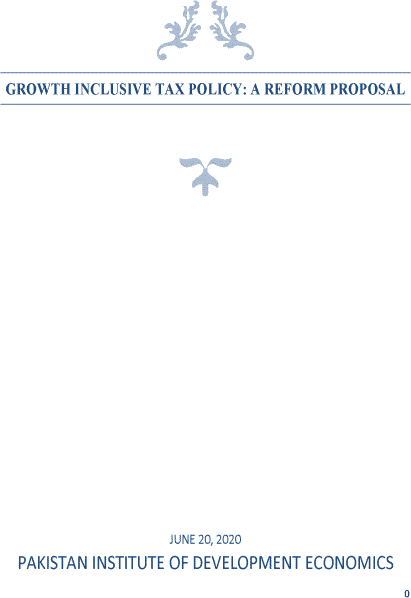
Pakistan Institute of Development Economics
- Home
Our Portals
MenuMenuMenuMenuMenuMenuMenu - ResearchMenuMenuMenuMenuMenuMenuMenu
- Discourse
- The PDR
- Our Researchers
- Academics
- Degree Verification
- Thesis Portal
- Our Portals
Growth Inclusive Tax Policy: A Reform Proposal PIDE Report
The document presents a reform proposal for a growth inclusive tax policy. The summary of the proposed reforms is given below: ▪ Withholding Tax (WHT) regime needs simplification • Withholdingisation1 needs to be reduced in the economy to improve efficiency. Finance Bill 2020 proposes to enhance thresholds to be considered as withholding agents for different tax provisions. It is commendable, and this reduction is recommended to be expanded to other tax provisions as well. • Make the process of readjustment or refunds of the unclaimed taxes easier. The FBR should streamline the online refund process on a priority basis to minimize economic cost. ▪ Some Sales and Withholding Taxes yield little revenue but are significant impediments for growth2 • To achieve simplification of the withholding tax regime and reduce the cost of compliance, the Finance Bill proposes the deletion of 9 withholding tax provisions. This is the beginning. There are another 35 out of 82 provisions in the income tax withholding regime which should be deleted. • Finance bill seeks to remove the additional customs duty on tariff lines for which the customs duty is 0%. All taxes on revenue non-spinner items should be abolished • Each new tax, including the withholding tax, should consider the economic cost and benefits in the budgetary proposal. Revenue non-spinners should be evaluated in terms of pre-post enactment, and future policy should be based on that. • The behavioural aspect of the economic agents should be considered in formulating new taxes/rates, and the forecasting capacity of the FBR needs to improve. ▪ Business Choking under Documentation • Real-time access to information and databases of various authorities such as NADRA, FIA, provincial excise and taxation departments should be allowed to the FBR. The use of the CNIC number as the NTN should be allowed to access all necessary information. • The minimum threshold of supplies by retailers to obtain the CNIC of buyers is proposed to be increased from Rs. 50,000 to Rs. 100,000. Unnecessary data should not be required from the withholding agents to reduce transaction costs and avoid additional burden on businesses (acting as withholding agents). The FBR needs to develop a data mining capacity to seek the required data. • The advance tax regime provides an incentive for filing. However, it should not be fixed or final and should be adjusted at the end of the year based on actual liabilities.



